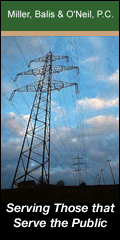
| Past Issues/Subscribe | Employment | neppa.org | Legislative Update | Advertise | December 2015 |

Energy Bill Heads for House Floor
In This Issue:
Energy Bill Heads for House Floor
The House is poised to consider H.R. 8, the "North American Energy Security and Infrastructure Act," the week of Nov. 30. H.R. 8 contains a number of provisions of interest to NEPPA, including providing the Department of Energy (DOE) with authority to instruct utilities to protect the grid in emergencies and improving the hydropower relicensing process. However, NEPPA has focused on Sec. 1110, a study aimed at promoting baseload generation in capacity markets that would increase costs to consumers without reforming the worst parts of the markets.
A Manager’s Amendment makes a number of changes from the version that was reported by the Energy and Commerce Committee Sept. 30, including stripping several funding provisions from the bill, including hydropower production and efficiency incentives, modifying the disclosure provisions of grid security measures, and adding the text of H.R. 2358, the Vegetation Management bill reported by the House Natural Resources Committee. Sec. 1110 remains unchanged, although Rep. Joe Kennedy III (D-MA) has filed an amendment to add consideration of costs to consumers to the list of issues the report must consider.
Amendments have also been filed to modify the hydropower provisions. Over 200 water and environmental groups pulled out the stops in opposition to the bipartisan language advanced by Reps. Jerry McNerney (D-CA) and Cathy McMorris Rodgers (R-WA). The groups sent a strongly worded letter to all House Members on Nov. 12, calling it an "unprecedented assault on our nation's rivers and the people and wildlife that depend upon them."
The McNerney-McMorris Rodgers amendment, a result of months of negotiations, would direct the Federal Energy Regulatory Commission (FERC) to consult with agencies and tribes in developing a schedule for all federal approvals of non-federal hydropower applications. It would also encourage the use of existing relevant and reliable studies and information where appropriate, identifying best practices and existing relevant studies.
On Nov. 18, five national trade associations, including APPA and the National Hydropower Association (NHA) sent a letter to House leadership to dispel claims that the provisions would undercut environmental statutes. The trade associations’ letter expressed concern over the environmental allegations and outlined in a "white paper" why the charges are false:
In closing, the groups said that the hydropower improvements impose a timing element, but do not dictate how federal, state or tribal regulators should exercise their regulatory responsibilities or what they must advocate. NHA is circulating a second letter to House leaders from industry groups supporting the provisions. NEPPA has added its name to that effort, although it remains opposed to the underlying bill.
On Nov. 4, the House passed its version of the long-term transportation authorization bill, H.R. 22, with an amendment advanced by Energy and Commerce (E&C) Chair Fred Upton (R-MI) that includes five energy-related provisions from H.R. 8. Unlike the energy bill, the long-term transportation bill is considered a "must pass" bill expected to move forward before the end of the year.
The Upton amendment added the following provisions from H.R. 8 to H.R. 22:
It is uncertain whether the Upton amendment will remain attached to the transportation bill as the chambers move to resolve differences between H.R. 22 and the Senate-passed highway bill.
To read the complete legislative update including the following topics, click the links below: |






